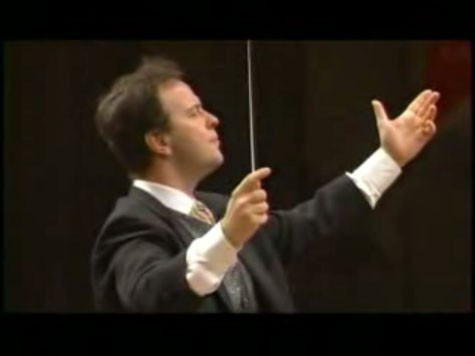A late Muti replacement, Oramo makes outstanding CSO debut

As it becomes increasingly inescapable that the debut season of Riccardo Muti as Chicago Symphony Orchestra music director is going to be largely a season deferred, one’s attention focuses invariably on the guest conductors who are filling the ailing Italian’s scheduled weeks.
Thursday night brought the CSO debut of Sakari Oramo, one of the seemingly endless crop of gifted podium leaders that Finland has given the world in recent decades. Oramo had the thankless task of succeeding Simon Rattle at the helm of the City of Birmingham Symphony Orchestra in 1999 when the British conductor went to Berlin, and by all accounts Oramo enjoyed an acclaimed decade at the helm managing to build on his famous British colleague’s successes.
The slender Finn looks younger than his 45 years, and conducts with a bristling, tautly focused intensity that belies his scholarly appearance.
Few orchestral warhorses are played as consistently poorly as Sibelius’s Finlandia, with many conductors content to whip up the brass and volume for cheap effect.
Oramo led off the evening with a notable and distinctive performance of this famous work by his country’s most celebrated composer. The Finnish conductor drew out the introduction spaciously yet maintained a firm grip and forward momentum in a lean, tough performance that highlighted the austere, elemental power of the music with a nervy dynamism that scraped away the usual cliches and soupiness.
Serge Prokofiev likely wrote more bad music than any other great composer of the 20th century (Exhibit A, his Fourth Symphony, heard last season).
Prokofiev’s wartime Symphony No. 6 is a more compelling work. Though it received initial acclaim at its 1947 premiere, the symphony’s strange mix of march-like themes, driving energy and piercing sadness soon came under attack by the Soviet cultural commissars. Along with works by Shostakovich and Khachaturian, Prokofiev’s symphony was condemned in the famous 1948 manifesto for “formalist perversions and anti-democratic tendencies” (i.e., being insufficiently obvious and tub-thumping in praise of Stalin and the Soviet state).
Unlike some Prokofiev works where surface flash and a wry burlesque reign, there is clearly something darker and deeper going on in this music. The three movements are often unsettling, the first segueing from a mordant astringency to a march-like theme that grows manic and out of control set against an ominous tick-tock-like tread.
Yet the darkness is balanced by a touching lyricism, particularly the tender soaring theme in the Largo that would not be out of place in Prokofiev’s ballet, Romeo and Juliet. The finale seems to want to end optimistically but can’t manage it, the motoric insistence–like the Fifth’s closer–giving way to a reprise of the melancholy theme of the opening and a decidedly ambivalent coda.
The Sixth Symphony is clearly a work that Ormao believes strongly in and the Finnish conductor elicited an impassioned, highly polished and committed performance that gave the greatest possible advocacy. Prokofiev’s Sixth may not be a masterpiece but Oramo almost made one a believer. The musicians, clearly responding to their guest maestro, gave Oramo everything he asked for in a gleaming and eloquent performance.
The centerpiece was Tchaikovsky’s not unfamiliar Violin Concerto, just heard on the same stage last May with concertmaster Robert Chen as soloist.

At 39, Vadim Repin is past the fiddle wunderkind period that launched his career two decades ago, his hair now a prematurely distinguished salt-and-pepper silver.
Apart from a couple slips—one, a badly muffed pizzicato at the start of the finale—Repin showed the sterling technique and easy bravura that have characterized his past performances and recordings. Yet for all the impressive technical arsenal and dazzling virtuosity, this was a curiously cool and bloodless performance, with little expressive warmth or individuality. Perhaps the Russian soloist felt out of synch with Oramo’s technocratic, at times blandly generalized accompaniment.
Wherever the case, the results were oddly remote and uninvolving, and even the obligatory standing ovation for nearly all soloists at Orchestra Hall was denied Repin Thursday night.
The program will be repeated 1:30 p.m. Friday, 8 p.m. Saturday and 7:30 p.m.Tuesday. cso.org; 312-294-3000
Posted in Performances




